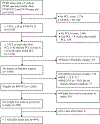PTSD symptom decrease and use of weight loss programs
- PMID: 31654900
- PMCID: PMC7029788
- DOI: 10.1016/j.jpsychores.2019.109849
PTSD symptom decrease and use of weight loss programs
Abstract
Objective: Posttraumatic stress disorder (PTSD) is associated with poor health behaviors, including low utilization of Veteran Health Affairs (VHA) weight loss programs. It is not known if clinically meaningful PTSD improvement is associated with increased use of weight loss programs.
Methods: Medical record data was obtained from VHA patients who received PTSD specialty care between Fiscal Year (FY) 2008 to FY2012. Clinically meaningful PTSD improvement was defined as ≥20 point PTSD Checklist (PCL) decrease between the first PCL ≥ 50 and a second PCL at least 8 weeks later and within 12 months of the first PCL. Eligible patients, n = 993, were followed through FY2015. Propensity scores and inverse probability of exposure weighting controlled confounding. Cox proportional hazard models estimated the association between clinically meaningful PCL decrease and weight loss clinic utilization. Supplemental analysis compared both PTSD groups vs. no PTSD.
Results: Patients were 44.8 (SD ±14) years of age, 88.9% male and 66.8% white. Patients with vs. without a clinically meaningful PCL decrease were more likely to use a weight loss clinic (HR = 1.37; 95%CI:1.02-1.85). Among those with a weight loss encounter, PCL decrease was not associated with the number of encounters (RR = 1.13; 95%CI:0.70-1.81). Compared to no PTSD, patients with PTSD improvement had more weight loss encounters.
Conclusions: Large improvements in PTSD are associated with increased utilization of weight loss programs, and PTSD is not a barrier to seeking weight loss counseling. Research to understand why improvement in PTSD is not related to better weight loss outcomes is needed.
Keywords: Cohort; Epidemiology; Health services; Nutrition; Posttraumatic stress disorder; Veteran; Weight.
Copyright © 2019 Elsevier Inc. All rights reserved.
Conflict of interest statement
References
-
- Bartoli F, Crocamo C, Alamia A, et al. Posttraumatic Stress Disorder and Risk of Obesity: Systematic Review and Meta-Analysis. Journal of Clinical Psychiatry. 2015;76(10):E1253–+. - PubMed
-
- Suliman S, Anthonissen L, Carr J, et al. Posttraumatic Stress Disorder, Overweight, and Obesity: A Systematic Review and Meta-analysis. Harv Rev Psychiatry. 2016;24(4):271–293. - PubMed
-
- van den Berk-Clark C, Secrest S, Walls J, et al. Association between posttraumatic stress disorder and lack of exercise, poor diet, obesity, and co-occuring smoking: A systematic review and meta-analysis. Health psychology : official journal of the Division of Health Psychology, American Psychological Association. 2018;37(5):407–416. - PMC - PubMed
-
- Klingaman EA, Hoerster KD, Aakre JM, Viverito KM, Medoff DR, Goldberg RW. Veterans with PTSD report more weight loss barriers than Veterans with no mental health disorders. General hospital psychiatry. 2016;39:1–7. - PubMed
-
- Maguen S, Hoerster KD, Littman AJ, et al. Iraq and Afghanistan veterans with PTSD participate less in VA’s weight loss program than those without PTSD. Journal of affective disorders. 2016;193:289–294. - PubMed


